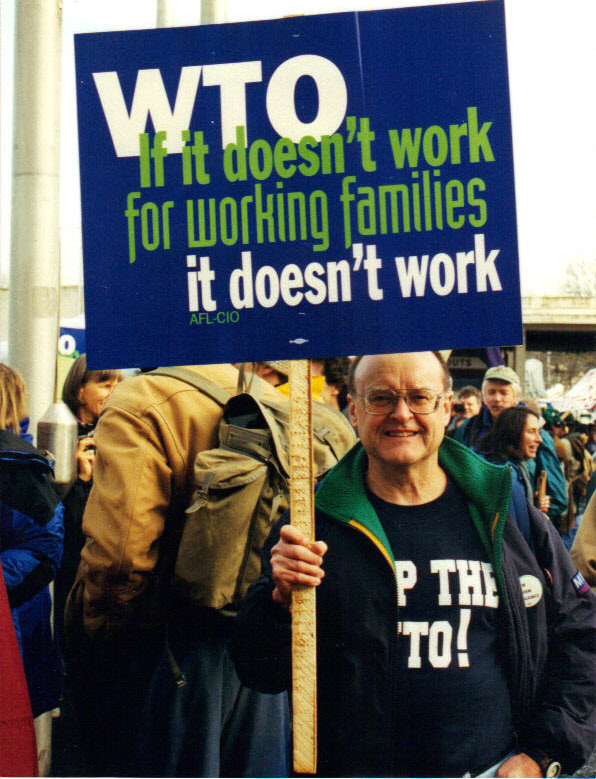Canada & The New World Order : The Challenge of Endless War | There is a Canadian Alternative

Canada and the New World Order
by John W. Warnock
Canadian Dimension Magazine,
Vol. 35, No. 6, November-December 2001.
Extract:
The Impact of 9/11 on Canadian policy
Jean Chretien pledged that our government would do anything that George W. Bush's Administration wants us to do in the war against terrorism. All our military resources are available to help. We are just waiting for orders. The Minister of Finance, Paul Martin, promised Canadians that there would be budget increases in the areas of military capabilities, terrorist control and policing, even if this meant more cuts to other important programs.
In 1991 the first President George Bush proclaimed the arrival of the New World Order, the unipolar world of one totally dominant military power created by the collapse of the Soviet bloc. Canadian governments and political parties have been forced to address this reality.
The established policy for Canada during the Cold War was to "interpret U.S. government policy" to the rest of the world. Our government's basic goal was to convince the people of the world that the existing international economic and political system was just, the best of all possible worlds.
Fronting for the United States
During the Cold War, Canada's relationship to the United States was the equivalent of Poland's relationship to the USSR. The classic example of this role occurred in 1956. When Egyptian President Gamal Abdel Nasser had the audacity to nationalize the Suez canal, the United Kingdom, France and Israel responded with an invasion.
President Dwight Eisenhower was not opposed to the goal of removing President Nasser but felt it was not done quickly enough. The political fallout from the bungled invasion threatened U.S. oil interests in the area. John Foster Dulles, the U.S. Secretary of State, came up with a plan to settle the dispute. Lester Pearson, Canada's Minister of External Relations, put forth the U.S. plan and it was accepted by the Security Council of the United Nations.
As a result of this settlement, Canada began its Cold War role as the key NATO representative on peace keeping operations. This was much more important to the U.S. government than our small contribution to NATO's military forces in Europe, as could clearly be seen during the long conflict in Indochina. Over the years the Canadian military was reorganized to carry out this task. In response to public opinion, Canadian governments began to insist that our participation should only be undertaken when done through the United Nations.
Canadian Foreign Policy
In the Iraq war of 1991, the conflict in Yugoslavia, and in the present "war on terrorism," the governments of Canada have given complete support to the U.S. government. The Tory and Liberal governments have been forced to abandon Canada's comfortable role as international peacekeeper and have demonstrated that they are willing to engage in good old fashioned military action, including bombing civilians, non-military targets, and unarmed soldiers who wish to surrender. Even the New Democratic Party and the Bloc Québécois supported the decision to bomb Yugoslavia.
The Chretien government endorsed the U.S. government's decision to bypass the United Nations and support U.S. military action, whether through NATO as in Yugoslavia or just unilaterally as in the "war on terrorism." Our government has set a clear policy course for us.
Is there a feasible alternative? Canadian foreign and defence policy has always been determined by our political and economic elite. We have never had anything approaching a democratic process for foreign policy formation.
The Canadian Alternative
But there has been no policy consensus in Canada There has been a counter view represented by a broad coalition of Churches, non-governmental organizations, civic association, and groups like the Canadian Labour Congress, the Council of Canadians, the National Action Committee on the Status of Women and the Assembly of First Nations. They formed the Canadian Peace Alliance in 1991 to oppose Canada's participation in the Gulf war. In general they have demanded a foreign and defence policy that is autonomous to that of the United States. Public opinion polls show that on many issues the majority of Canadians support this alternative. But this loose counter coalition has rarely been able to change the direction of the government on any important foreign policy matter. It has proven to be important but inadequate.
At the end of World War II people dreamed of a United Nations that would support peace and the right of all nations to self determination and economic justice. In Canada that view was found in the Co-operative Commonwealth Federation (CCF) Party. A key change occurred when the Cold War was declared and NATO was created to bypass the UN. Across the industrialized, western world, social democratic parties like the CCF fell into line. Today their leading spokesmen have been like Tony Blair and Gerheart Schroeder, vocal advocates for mass bombing. Only the Green parties and the new left European parties are still committed to a peaceful world based on social justice, equality and concern about our ecology. They need our support.
John W. Warnock is a Regina sociologist and political economist, author, and is an active member of the New Green Alliance.
...
 I continue to put out new articles and material that you can find on my blog at blogspot.
I continue to put out new articles and material that you can find on my blog at blogspot.
